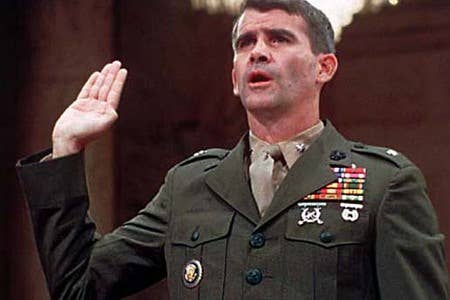Activision defends Oliver North's involvement in Black Ops 2
Spokesperson says Iran Contra figure helped to make game authentic
Activision has defended its decision to hire Oliver North as a military consultant for the forthcoming Black Ops 2, arguing that he helped to make the game more authentic.
North is infamous for his involvement in the Iran Contra affair, a scandal which embroiled the Reagan government during the '80s. North was accused of selling weapons to Iran illegally in a deal to release US hostages. Funds from the deals were alleged to have been awarded to violent South American rebels called Contras who were attempting a coup against a legitimate socialist government in Nicaragua.
Whilst the US government issued propaganda leaflets calling the Contras freedom fighters, urging citizens to pledge financial support, many saw them as violent terrorists with close ties to drug dealing and other organised crime.
When the scheme was discovered after a shipment of guns was shot down over Nicaragua, North destroyed a number of damning documents with a shredder. North was initially convicted, but the decision was overturned on appeal. He remains a controversial and divisive figure in modern American history, and raised many eyebrows when he appeared in a promotional documentary for Black Ops 2 earlier this month.
Kotaku, which raised the initial story and published a scathing editorial regarding North's involvement, took the opportunity to question Activision on its decision.
"When we create the fictions that we create, we do a bunch of research and try to talk to subject matter experts on it," said Activision's Mark Lamia.
"Part of that research is reading and watching documentaries and movies and everything else. What can be a part of it is talking to people who've been through the experiences, people like Hank [Lt. Col. Keirsey, military advisor], and when you're talking about doing something in the '80s, black ops, when we were doing research in the conflicts that we were covering and everything else and some of our conflicts ... in any event he rises to the top as someone who was probably, obviously the most well-known covert operations [person].
"So it made sense for us from a game development point of view to spend the time and be able to talk to [him]. One of the things we do is we have these brushes with history in our Black Ops fiction. That's a signature, I think, to the way we create our historical fiction. We set you up with that.
"We're not trying to put anyone on a pedestal. We're trying to create our fiction as game developers, as creators."
Mark Lamia, Activision
"We put you in this place where it's, 'Ok, I'm in that part of history,' and we have sort of that fiction we weave right through. Part of doing that has been and is getting a first-hand account whether that was last time in Black Ops, when we were highlighting parts of Vietnam, meeting with someone who was a real S.O.G. who did black operations in Vietnam and in this case with Lt. Col Oliver North."
Lt Col Kiersey, also present in the interview, was ushered away by an Activision PR representative whilst defending North after Kotaku journalist Stephen Totilo pointed out that many Kotaku saw North as a national traitor.
"Do they know what he really did," Keirsey asked. "I guess I'm out of line even coming into the interview, but the man was involved in a crux of history..."
Lamia then continued to argue that North was a good choice of consultant, having been so closely involved with the real life subject matter which has helped to inspire Black Ops' fiction.
"We chose to take on that late '80s time frame and when you think about that late '80s time frame... you know, we're not trying to put anyone on a pedestal. We're trying to create our fiction as game developers, as creators. Choosing this person, somebody who has met with leaders, and has run black operations, and understands that was really valuable to have that sort of first-hand account from him... Even down to people who he's met with in terms of understanding this is somebody who has sat at these tables."

